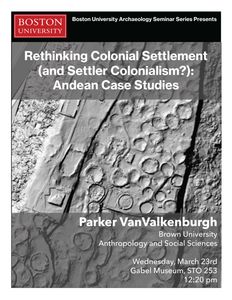3/23 Archaeology Lecture Series: Rethinking Colonial Settlement (and Settler-Colonialism?): Andean Case Studie
About this event
During the Spring of 2022, Boston University’s Archaeology Program will be hosting a series of lectures. Our third lecture is titled Rethinking Colonial Settlement (and Settler-Colonialism?): Andean Case Studies and will take place Wednesday, March 23rd from 12:20 pm–1:15 pm in person, Gabel Museum of Archaeology, Room 253. We are thrilled to have archaeologist and scholar Dr. Parker VanValkenburgh (Brown University) joining us to share their work on this topic and to engage in a conversation with the BU Archaeology community.
Abstract: In this talk, I critically examine the distinction between “settler” and “franchise” forms of colonialism, first elaborated in the influential work of anthropologist Patrick Wolf, and suggest how archaeologists might play a role in reworking it. I argue that, in the context of both Inka and Spanish imperialism, practices of settlement — e.g., city planning, land claims, the exploitation of Indigenous and enslaved labor, and landscape modifications – often played substantially different roles than they did in the largely Anglo-centric cases that dominate contemporary discussions of setter-colonialism in corollary fields. These distinct histories of colonial settlement in Andean South America have, in turn, also resulted in substantially different configurations of racial discourse and Native political expression in contemporary South American nation-states. To make sense of these different logics and legacies, I attempt to re-envision settlement itself in more expansive terms, as a process in which relationships between people, histories, institutions, ecologies, and materials are reworked and anchored in place(s).  All forms of colonialism entail some form of settlement, but distinct regimes gather land, labor, genealogy, wealth, and other objects of colonial desire in different ways. And because settlements are at once material and conceptual, they leave behind material and affective residues that shape and constrain political horizons, including after they have ostensibly broken down. Archaeology provides perspectives and methodologies that are particularly well suited to studying these residues.
All forms of colonialism entail some form of settlement, but distinct regimes gather land, labor, genealogy, wealth, and other objects of colonial desire in different ways. And because settlements are at once material and conceptual, they leave behind material and affective residues that shape and constrain political horizons, including after they have ostensibly broken down. Archaeology provides perspectives and methodologies that are particularly well suited to studying these residues.
Dr. Parker VanValkenburgh (PhD, Harvard University, 2012) is the Stanley J. Bernstein Assistant Professor of Social Sciences and Assistant Professor of Anthropology at Brown University. His research and publications employ archaeological methods to address anthropological research questions, with a particular focus on the long-term impacts of colonialism and imperialism on Indigenous people and environments in Andean Peru. Through the study of diverse materials and media––including architecture, ceramics, environmental datasets, and archival documents––he seeks to understand how relationships between people, institutions, and environments are transformed in the course of imperial histories, as well as how the strategies of survival and resilience that communities develop to deal with empires are passed down and reworked across generations. In the course of doing so, he strives to generate approaches that are widely applicable to the study of empire(s) beyond the Andean region and which contribute to interdisciplinary understanding of imperial legacies in the modern world. In this work, he draws amply on digital methodologies, including the tools of geographic information systems (GIS), to map and analyze social, political, and environmental change in space and time. He also applies a critical lens to the study of digital media and methodologies, asking not just how these techniques facilitate archaeological scholarship, but how digital mediation transforms the ways we work with collaborators, research subjects, students, and public audiences.
Among other projects, he is currently co-director (with Carol Rojas Vega) of the Paisajes Arqueológicos de Chachapoyas (PACha) project, an investigation of long-term human-environment interaction in Peru’s Chachapoyas region, grounded in the analysis of archaeological survey, archival research, remotely sensed datasets, and work with contemporary communities in the provinces of Luya, Chachapoyas, and Bongará, Amazonas (Peru). He is also a co-director, with Steven Wernke (Vanderbilt University), of GeoPACHA(Geospatial Platform for Andean Culture, History and Archaeology); and, with Alicia Odewale (University of Tulsa) Mapping Historical Trauma in Tulsa, 1921-2021. From 2008 to 2016, he directed the Proyecto Arqueológico Zaña Colonial, a project focusing on the impacts of Spanish colonial forced resettlement (reducción) on landscapes and political subjectivities in Peru’s North Coast region.